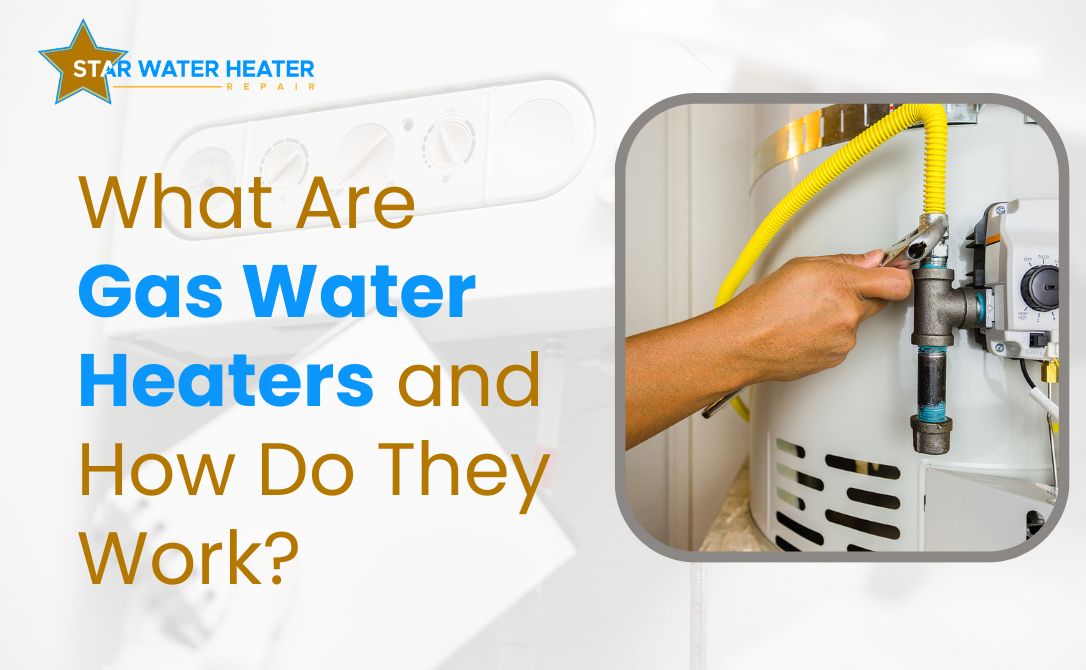What Are Gas Water Heaters and How Do They Work?
When it comes to home comfort, reliable hot water isn’t just a luxury it’s a necessity. Hot water plays a crucial role in daily life, from showering to running dishwashers and washing machines. One of the most efficient and long-lasting options for providing this comfort is a gas water heater.
But what exactly is a gas water heater, and how does it work? In the following blog, we’ll discuss the types of gas water heaters, explain how they operate, and help you understand why they may be the right choice for your home. We’ll also dive into key considerations like energy efficiency, maintenance, and sizing, ensuring that you can make an informed decision.
What Is a Gas Water Heater?
A gas water heater heats water for household use using natural gas or propane. Unlike electric heaters, which rely on electrical resistance, gas water heaters use combustion to produce heat. They are favored in many regions for their ability to heat water quickly and efficiently, especially in homes with higher demand.
Most gas water heaters come in two main types:
- Tank Water Heaters: Traditional models that store a set amount of water, typically between 30 to 75 gallons.
- Tankless Water Heaters: On-demand systems that heat water as it flows through the unit, providing an endless supply of hot water without the need for a storage tank.
The Benefits of Gas Water Heaters:
- Faster Heating: Gas models generally heat water faster than electric counterparts, with quicker recovery times, which means less waiting between showers or laundry loads.
- Lower Operating Costs: In regions where natural gas is cheaper than electricity, these heaters offer significant savings on utility bills.
- Efficiency in Larger Homes: For households with higher water demand, gas water heaters often outperform electric ones in both speed and cost-efficiency.
You can also read: Water Heater Safety Tips for Homeowners
How Does a Gas Water Heater Work?
Gas water heaters operate using a straightforward but highly efficient process:
- Ignition of Burner: At the heart of a gas water heater is the burner, which ignites when the thermostat senses the need for heat. The burner is fueled by natural gas or propane, creating a controlled flame that heats the water.
- Heat Exchanger: The heat produced by the burner is transferred to the water through the heat exchanger. This metal component absorbs the heat and allows it to flow into the water efficiently.
- Water Storage (for Tank Models): In traditional tank water heaters, the heated water is stored in a tank. These tanks are insulated to retain heat and keep the water warm until it’s needed. The tank size typically ranges from 30 to 75 gallons, depending on household needs.
- On-Demand Heating (for Tankless Models): In a tankless system, water flows through a heated coil or exchanger when a hot water tap is turned on. Since there’s no storage tank, the water is heated instantly as it passes through, delivering hot water on-demand without the need for pre-heating or storage.
- Thermostat Control: The thermostat monitors the temperature and regulates the heating process, ensuring that water reaches the d esired temperature and preventing overheating. Modern systems also come with smart thermostats that allow for precise control over energy use.
Why Choose a Gas Water Heater Over Electric?
While electric water heaters have their place, gas water heaters often provide better performance and savings, especially for larger homes. Let’s break down the differences:
- Heating Speed: Gas water heaters heat water faster and have a shorter recovery time compared to electric models. This is particularly advantageous in households where multiple showers or appliances may be used simultaneously.
- Operating Costs: Gas water heaters typically cost less to operate in regions where natural gas prices are lower than electricity rates. This can lead to noticeable savings over time, especially for homes with higher water demands.
- Energy Efficiency: Modern gas water heaters, particularly tankless models, can achieve high energy efficiency ratings (some over 95%). This makes them ideal for eco-conscious homeowners looking to reduce energy waste and lower their utility bills.
- Environmental Considerations: While gas water heaters do produce carbon emissions, they are generally cleaner than electric heaters in regions where electricity is generated from coal or other non-renewable sources. Pairing a gas water heater with energy-saving features like smart thermostats can further reduce its environmental impact.
How to Size a Gas Water Heater: Getting the Right Fit for Your Home
Choosing the right size for your gas water heater is crucial to ensuring efficiency and comfort. If your heater is too small, you may run out of hot water during peak times. If it’s too large, you’ll waste energy heating more water than you need. Here’s how you can decide:
- 30-Gallon Tank: Suitable for households with 1-2 people or light hot water usage.
- 40-50 Gallon Tank: Ideal for households of 3-4 people, handling moderate hot water usage.
- 75+ Gallon Tank: Necessary for larger households of 5+ people or homes with high hot water demands (e.g., multiple showers running simultaneously).
- Tankless Models: These are perfect for homes with unpredictable or continuous hot water needs, as they provide an unlimited supply of hot water without taking up much space.
Pro Tip: When sizing your water heater, consider peak usage times (such as mornings or evenings). A larger tank or tankless model is recommended if several family members shower around the same time or you run multiple hot water appliances simultaneously.
Maintenance Tips for Long-Term Efficiency
A well-maintained gas water heater can last for 10-15 years or more, but neglecting maintenance can lead to reduced efficiency, higher energy bills, and costly repairs. Here’s what you need to do:
- Flush the Tank Annually: Sediment buildup in the tank can reduce heating efficiency and lead to premature failure. Flushing the tank at least once a year helps remove this sediment.
- Check and Replace the Anode Rod: The anode rod prevents corrosion by attracting minerals that would otherwise damage the tank lining. Checking it every 1-2 years and replacing it when necessary can extend the life of your heater.
- Professional Inspections: Schedule annual inspections with a qualified technician to ensure your system is operating safely and efficiently. They can also check for gas leaks, test the burner, and inspect the venting system to avoid dangerous issues like carbon monoxide buildup.
- Monitor for Leaks or Unusual Noises: Leaks, unusual noises, or fluctuating water temperatures may be early signs of trouble. Addressing these issues early can prevent larger problems down the road.
Wrapping Up!
A gas water heater is an excellent option for households seeking a reliable, cost-effective, and efficient way to meet their hot water needs. Whether you’re considering a traditional tank model or a cutting-edge tankless system, gas heaters offer long-term savings and performance advantages that make them a top choice for homeowners looking to balance comfort and energy efficiency.
At Star Water Heater, we specialize in offering premium water heater solutions tailored to your unique needs. Our expert technicians are ready to help you choose the perfect system, ensuring years of efficient, worry-free operation.
Contact us today to learn more about the best gas water heater options for your home!




